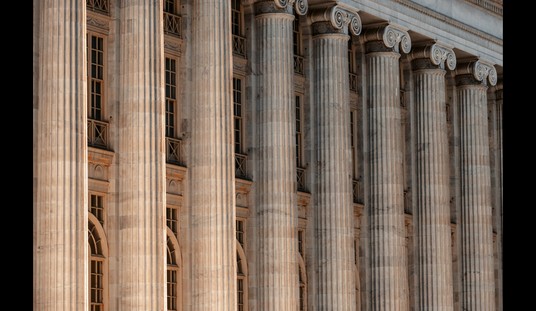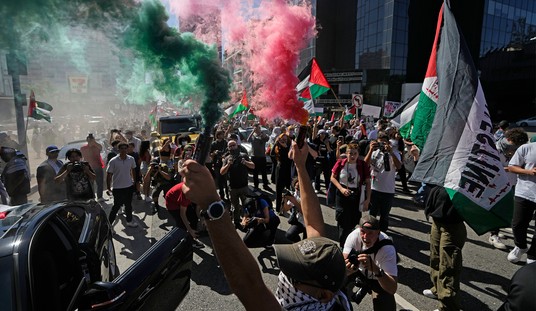
Iranian supreme leader Ayatollah Ali Khamenei delivers a speech on the 17th anniversary of death of the late revolutionary founder Ayatollah Khomeini, in his mausoleum just outside Tehran, Iran, Sunday, June 4, 2006. Khamenei, warned Sunday that energy supplies from the Gulf region would be disrupted if Iran came under attack from the United States and insisted his country would not give up the right to produce nuclear fuel. (AP Photo/Vahid Salemi)
The Wall Street Journal reported on a little-known backchannel the U.S. sometimes turns to for communications with Iranian government officials. According to the Journal, it has been used by seven U.S. presidents starting with President Carter during the 1980 hostage crisis. Swiss diplomats refer to this role as the “brieftrager” or “the postman.”
Early on Friday morning, January 3, just hours after the U.S. drone strike had sent Quds Force Gen. Qassem Soleimani to martyrdom, an encrypted fax was received in a sealed room at the Swiss Embassy in Tehran. The message, from U.S. officials, was then hand-delivered by Swiss Ambassador Markus Leitner to Iranian Foreign Minister Javad Zarif. It said, “Don’t escalate.”
Over the next few days, Leitner was kept busy delivering messages back and forth from his Embassy to the Iranian leaders “in a low-key but high-wire diplomatic mission designed to let each side speak candidly.”
The Iranian’s first message, according to a U.S. official who had been briefed, was obviously and understandably angry. It said, “[U.S. Secretary of State Mike] Pompeo is a bully. The U.S. is the cause of all the problems.” He added, “That same day, Mr. Zarif called the Swiss ambassador to take a message to the U.S. It was more restrained. Statements from both sides helped prevent miscalculations.”
In the meantime, both President Trump and Zarif continued to hurl insults at each other on Twitter.
Trump tweeted that he had a list of 52 targets, one for each of the American hostages taken in 1979, some of which were cultural sites, that would be hit if Iran chose to strike back hard. He warned: “Those targets, and Iran itself, WILL BE HIT VERY FAST AND VERY HARD.”
And Zarif returned fire, tweeting: “A reminder to those hallucinating about emulating ISIS war crimes by targeting our cultural heritage. Through MILLENNIA of history, barbarians have come and ravaged our cities, razed our monuments and burnt our libraries. Where are they now? We’re still here, & standing tall.”
Following Iran’s face-saving missile strike on two Iraqi military bases known to house American troops on Tuesday night, which did not result in any casualties, the U.S. and Iran had walked back from the brink of war.
Both U.S. and Swiss officials confirmed this story to the Journal. A senior U.S. official said, “This is one of the few means of direct, confidential communication between the two sides…It’s been the most enduring method since the 1979 Islamic Revolution—for the White House to exchange messages with Iran’s top leadership.”
Another said, “We don’t communicate with the Iranians that much, but when we do the Swiss have played a critical role to convey messages and avoid miscalculation.”
And a third told the Journal that, “When tensions with Iran were high, the Swiss played a useful and reliable role that both sides appreciated. Their system is like a light that never turns off.”
The Swiss Foreign Ministry “confirmed there had been an exchange of messages, but declined to comment further.”
According to the Journal:
Officials in both countries described this back channel as far more measured than the fiery rhetoric traded publicly by politicians.
A spokesman at Iran’s mission to the United Nations declined to comment on the exchanges but said “we appreciate [the Swiss] for any efforts they make to provide an efficient channel to exchange letters when and if necessary.”
One Iranian official said the back channel provided a welcome bridge, when all others had been burned: “In the desert, even a drop of water matters.”
The Journal wrote that after Trump reimposed sanctions, he called on the Swiss to deliver a phone number to the Iranians. The message read, “I’d like to see them call me.”
Switzerland’s role as intermediary is possible because of its status as a neutral country. They have no army, but a large percentage of Swiss citizens are armed.
As recently as last month, the U.S. called on the Swiss to mediate a simultaneous prisoner swap with Iran. “U.S. special envoy to Iran Brian Hook and Iran’s Mr. Zarif sat in separate rooms at a special hangar in the Zurich airport as the Swiss directed the carefully choreographed exchange.”
Former New Mexico Gov. Bill Richardson, who was involved in the prisoner exchange, told the Journal, “The Swiss channel has become enormously important because of what they can do in the short term to lessen tensions. It’s the only viable channel right now.”
Swiss diplomats also act as intermediaries between other countries. They’ve “represented Iran in Saudi Arabia, Georgia in Russia and Turkey in Libya.”
Aside from the obvious benefits Switzerland receives such as peace in the region, the country also profits economically from this role. “Currently, Swiss diplomats are working to get Washington’s green light for Swiss banks to finance exports to Iran that aren’t subject to sanctions—like food and medicine.”
A former Swiss ambassador told the Journal, “We do things for the world community, and it’s good. But it is also good for our interests.”













Join the conversation as a VIP Member